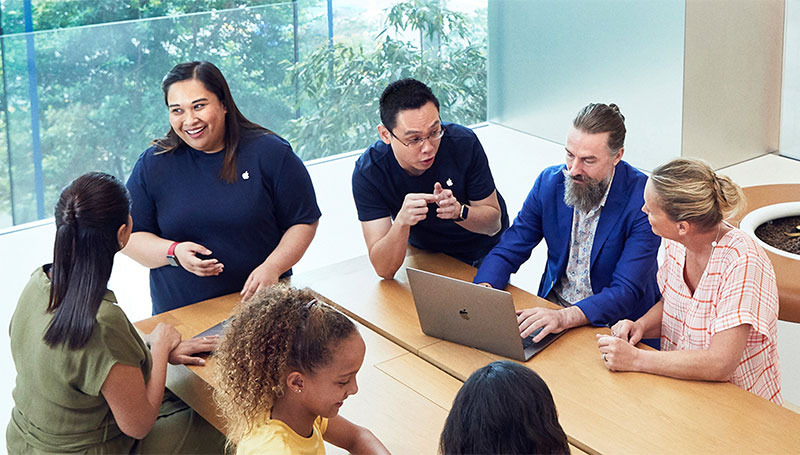The California Supreme Court in a decision delivered on Thursday found Apple broke state law by not paying retail workers for the time they spent participating in mandatory bag and device searches, leaving the company liable for millions in unpaid wages.
In a unanimous ruling (PDF link), the court holds employees were and are in Apple's control during mandatory exit searches of bags, packages, devices and other items. As such, Apple is required to compensate its employees for time spent on the anti-theft program, which in this case allegedly amounted to up to 20 minutes worth hundreds or thousands of dollars a year.
Chief Justice Tani Cantil-Sakauye notes courts should consider a number of factors when evaluating employer-controlled conduct, including location, degree of employer control, benefit to employees and disciplinary consequences. Applying the logic to the current case, "it is clear that plaintiffs are subject to Apple's control while awaiting, and during, Apple's exit searches. Apple's exit searches are required as a practical matter, occur at the workplace, involve a significant degree of control, are imposed primarily for Apple's benefit, and are enforced through threat of discipline," Cantil-Sakauye writes.
Apple's policy demands hourly retail employees submit to a search of personal packages and bags at the end of each shift and when clocking out for meal breaks. The checks are performed off-the-clock, meaning workers do not get paid for the mandatory procedure.
A pair of former employees originally led a class action suit against Apple in 2013, seeking compensation for unpaid minimum wages, unpaid overtime and unpaid waiting time. The U.S. District Court for the Northern District of California dismissed the case in 2015 on a determination that plaintiffs could have effectively bypassed Apple's searches by not bringing a bag to work.
On appeal, the U.S. Court of Appeals for the Ninth Circuit sought clarity from the California Supreme Court as to whether bag searches are "compensable as 'hours worked'" under the California Industrial Welfare Commission Wage Order.
For its part, Apple argues that the anti-theft measures are for the benefit of its employees, noting it could have prohibited all bags and devices from the workplace. The court in its determination today disagreed and construed the policy as a benefit for Apple.
"Under the circumstances of this case and the realities of ordinary, 21st century life, we find far-fetched and untenable Apple's claim that its bag-search policy can be justified as providing a benefit to its employees," the court said.
As noted by Bloomberg Law, which reported on the decision earlier today, the court also took issue with Apple's claims suggesting it was providing employees with a convenience by allowing them to bring their iPhone to work.
"The irony and inconsistency of Apple's argument must be noted," the decision reads, referencing Apple's public statements on the necessity of smartphones. "Its characterization of the iPhone as unnecessary for its own employees is directly at odds with its description of the iPhone as an integrated and integral' part of the lives of everyone else."
The court also points to a 2017 interview with Apple CEO Tim Cook, who said devices like iPhone have "become so integrated and integral to our lives, you wouldn't think about leaving home without it."
Apple's case will return to the Ninth Circuit which, as Bloomberg Law reports, revived similar bag check cases involving Nike Retail Services Inc. and Converse Inc.
 Mikey Campbell
Mikey Campbell




-xl-m.jpg)


-m.jpg)






 Chip Loder
Chip Loder
 Thomas Sibilly
Thomas Sibilly
 Wesley Hilliard
Wesley Hilliard
 Christine McKee
Christine McKee
 Amber Neely
Amber Neely
 William Gallagher
William Gallagher
 Malcolm Owen
Malcolm Owen









56 Comments
I'm with the employees on this one and think the court ruled well (at least from the presentation in the article as I won't have time to read the formal ruling).
I'm sure a more agile system can be implemented. Up to 20 minutes lost adds up very quickly.
I am with the employees. Apple is pretty stupid on this one.
1) Did the court rule that bag checks were illegal (as the title suggests) or that it's illegal to not compensate employees for time for doing a legal bag check?
2) I'm all for this and have been since it was first reported. Lots of blindly pro-Apple people were against the employees on this one, with comments about how they shouldn't bring any personal belonging with them (even if that meant no food or other items while being away from home all day long) to leaving stuff in a car (where it could easily get broken into or not an option since public transportation in major cities is the only viable method for getting to and from work) to being told to suck it up and that the pleasure of working for Apple should be enough.
Looks like they should fire half the retail staff and put everyone on salary instead of hourly. Would make the security checks go faster and there would be no overtime pay.